
Carlos López Puccio
出生 : 1946-10-09, Rosario, Santa Fe, Argentina
略歴
Carlos Alberto Daniel López Puccio (born October 9, 1946, in Rosario, Santa Fe, Argentina) is a multi-instrumentalist musician, orchestral and choral conductor, composer, arranger and one of the current members of Les Luthiers.
After graduating from orchestral conducting in La Plata, he was hired by Les Luthiers to play the fiddlecan (a violin made of tuna can), and famously learnt the repertoire in two days (around 1970). For the next season, he started a songwriting partnership with Jorge Maronna, and they penned 'Pieza en Forma de Tango'; he also composed 'Voglio Entrare Per la Finestra' (with libretto by Marcos Mundstock) and around June 1971 he was invited to be a group member rather than a paid collaborator.
During the first years in Les Luthiers, López-Puccio played other instruments such as cello, viola and percussion, and he often provided backing vocals. He also composed all the music for many pieces for the group, including 'Concierto de Mpkstroff' (which features group-mate Carlos Núñez Cortés as soloist) and 'Brotan und Gretchen'. He slowly gained notoriety scripting jokes for his groupmates as well as occasional song lyrics.
From 1979 onwards he also played piano, synthesiser and harmonica for several musical pieces, especially since Ernesto Acher left the group, and they started including electronic keyboards more often. He also became more and more involved as an actor, having several starring parts from the 80's onwards.
Description above from the Wikipedia article Carlos López Puccio, licensed under CC-BY-SA, full list of contributors on Wikipedia.

Formed in 1967 by Gerardo Masana, during the height of a period of very intense Choral Music activity in Argentina's state universities, Les Luthiers premiered this show on Friday, May 13, 2011 at the Astengo Theater, Rosario, Argentina. PROGRAM: 1- Manuel Darío; 2- La Comisión; 3- La Bella y Graciosa Moza Marchose a Lavar la Ropa; 4- Solo Necesitamos; 5- La Hija de Escipión; 6- Bolero de los Celos; 7- Educación Sexual Moderna; 8- La Redención del Vampiro; 9- Encuentro en el Restaurante; 10- Los Jóvenes de Hoy en Día; 11- Rhapsody in Balls. The 'Campanófono autoflajelador' instrument made its first appearance during this show. Recorded live between June the 15th and the 16th, 2013 at the Gran Rex Theater, Buenos Aires, Argentina.
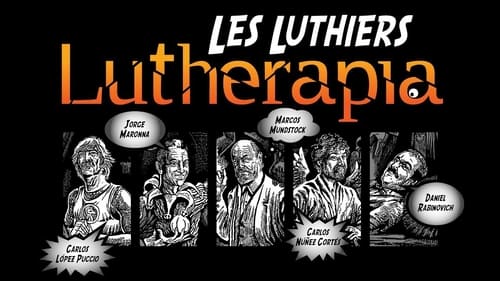
Lutherapia es un espectáculo teatral de humor musical del conjunto argentino de instrumentos informales Les Luthiers. Se estrenó el 22 de agosto de 2008 en el Teatro Astengo, de Rosario, Argentina, y su éxito logró que permaneciera en cartelera hasta el 2010, luego, siendo sucedido por el espectáculo ¡CHIST!, el cuál es un antología de Les Luthiers y lleva varias semanas vigente. El espectáculo gira en torno a un terapia psicoanalítica en la que Marcos Mundstock representa el papel de psicólogo y Daniel Rabinovich el de paciente, y la charla entre ambos va dando lugar a los números que componen el espectáculo. Este espectáculo ha sido aclamado tanto por la crítica como por el público.

40 aniversario del grupo Les Luthiers

The Mastropiero Awards is a musical humor theatrical show by the Argentine ensemble of informal instruments Les Luthiers, in which the classic format of their previous shows is not repeated. In this show, the group simulates an award ceremony for various artists from the fields of cinema, theater, television and music. During the ceremony, works and compositions by Johann Sebastian Mastropiero himself are performed. The play premiered at the Astengo Theater in Rosario, Argentina, on July 29, 2005
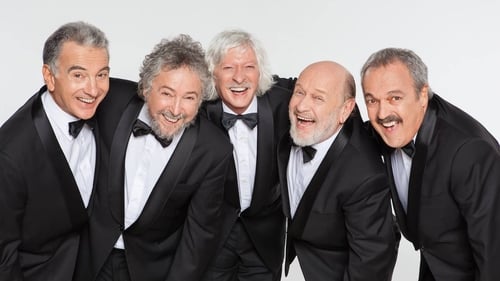
Les Luthiers
Here Les Luthiers is a recital of the Argentine group of informal musical instruments Les Luthiers, made especially for the 45th edition of the Cosquín Folk Festival. It was presented for the only time on January 28, 2005, at the Plaza Prosper Molina in the city of Cosquín, Córdoba, Argentina, traditional venue of the festival.1

Les Luthiers is a comedy-musical group from Argentina, very popular also in several other Spanish-speaking countries such as Paraguay, Peru, Chile, Ecuador, Spain, Colombia, Mexico, Uruguay and Venezuela. They were formed in 1967 by Gerardo Masana, during the height of a period of very intense Choral Music activity in Argentina's state universities.

Director
El Grosso Concerto, opus 58, fue un espectáculo del conjunto de instrumentos informales Les Luthiers en compañía de la Camerata Bariloche. El título, El Grosso Concerto, es en realidad una variación del título de una obra incluida en el espectáculo: el Concerto grosso alla rústica (un verdadero concerto grosso barroco, al estilo de Vivaldi). Esta obra fue compuesta por el compositor ficticio Johann Sebastian Mastropiero, inspirado en un poema del "famoso" poeta ficticio Torcuato Gémini. El título de la obra no tiene nada que ver con la forma musical de que se trata (el concerto grosso barroco), sino a la dedicatoria que le hizo Gemini a una regordeta y tosca doncella del altiplano argentino, a la que iba dedicado el poema. Dicha dedicatoria decía así: "Con certo sentimento d´amore, alla signorina grossa e rústica".

El Grosso Concerto, opus 58, fue un espectáculo del conjunto de instrumentos informales Les Luthiers en compañía de la Camerata Bariloche. El título, El Grosso Concerto, es en realidad una variación del título de una obra incluida en el espectáculo: el Concerto grosso alla rústica (un verdadero concerto grosso barroco, al estilo de Vivaldi). Esta obra fue compuesta por el compositor ficticio Johann Sebastian Mastropiero, inspirado en un poema del "famoso" poeta ficticio Torcuato Gémini. El título de la obra no tiene nada que ver con la forma musical de que se trata (el concerto grosso barroco), sino a la dedicatoria que le hizo Gemini a una regordeta y tosca doncella del altiplano argentino, a la que iba dedicado el poema. Dicha dedicatoria decía así: "Con certo sentimento d´amore, alla signorina grossa e rústica".
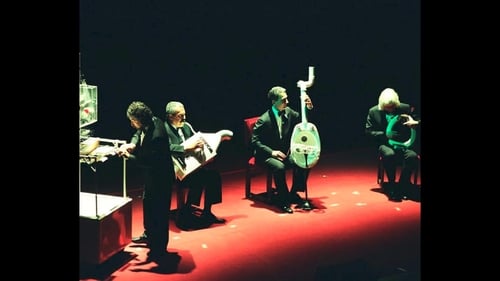
Todo por que rías es un espectáculo realizado por el conjunto de instrumentos informales Les Luthiers, estrenado en el Teatro Astengo de Rosario, Argentina el 3 de junio de 1999, y representado por última vez el 8 de agosto de 2005 en el Auditorio Alfredo Kraus, de Las Palmas de Gran Canaria, España. De nuevo aprovechan el título del espectáculo para hacer un juego de palabras (Todo por que rías/Todo porquerías), como es costumbre en el grupo argentino.

Director
Premiered on June 9, 1994 at the Astengo Theater, in Rosario, Argentina. Last performance on January 31, 1999, at the Auditorium Theater, in Mar del Plata, Argentina. PROGRAM: 1 - El regreso del indio 2 - Manuel Darío 3 - Así hablaba Sali Baba 4 - El negro quiere bailar 5 - San Ictícola de los peces 6 - A la playa con Mariana 7 - Perdónala 8 - Fronteras de la ciencia 9 - Vote a Ortega
Instruments premiered on this show: Bajo Barríltono Ferrocalíope. Recorded at the Auditorium Theater, Mar del Plata, Argentina, January 30, 1999.

Premiered on June 9, 1994 at the Astengo Theater, in Rosario, Argentina. Last performance on January 31, 1999, at the Auditorium Theater, in Mar del Plata, Argentina. PROGRAM: 1 - El regreso del indio 2 - Manuel Darío 3 - Así hablaba Sali Baba 4 - El negro quiere bailar 5 - San Ictícola de los peces 6 - A la playa con Mariana 7 - Perdónala 8 - Fronteras de la ciencia 9 - Vote a Ortega
Instruments premiered on this show: Bajo Barríltono Ferrocalíope. Recorded at the Auditorium Theater, Mar del Plata, Argentina, January 30, 1999.
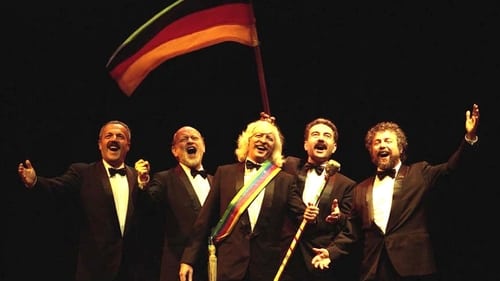
Writer
Premiered on June 13, 1996 at the Astengo Theater, in Rosario, Argentina and last performance on December 3, 2002, at the Sports Pavilion, in León, Spain, 'Bromato De Armonio' was a show made by the Argentinian comedy-musical group Les Luthiers. The show itself was showcased all around Latin America between 1996 and 2001. PROGRAM: 1. Para Elizabeth (sonata a la carta); 2. La Princesa Caprichosa (pequeña serenata para grandes instrumentos); 3. La Vida es Hermosa (disuacidio); 4. La Hija de Escipión (fragmento de ópera); 5. La Redención del Vampiro (hematopeya); 6. Educación Sexual Moderna (cántico enclausturado); 7. ¿Quién Mató a Tom McCoffee? (música en serie); 8. La Comisión (himnovaciones); 9. Perdónala (bolérolo)
The 'Campanófono a martillo' and the 'Cornetas de Asiento' were premiered on this show. Recorded live at the Teatro Coliseo in Buenos Aires, Argentina, on June the 27th, 1998.

Director
Premiered on June 13, 1996 at the Astengo Theater, in Rosario, Argentina and last performance on December 3, 2002, at the Sports Pavilion, in León, Spain, 'Bromato De Armonio' was a show made by the Argentinian comedy-musical group Les Luthiers. The show itself was showcased all around Latin America between 1996 and 2001. PROGRAM: 1. Para Elizabeth (sonata a la carta); 2. La Princesa Caprichosa (pequeña serenata para grandes instrumentos); 3. La Vida es Hermosa (disuacidio); 4. La Hija de Escipión (fragmento de ópera); 5. La Redención del Vampiro (hematopeya); 6. Educación Sexual Moderna (cántico enclausturado); 7. ¿Quién Mató a Tom McCoffee? (música en serie); 8. La Comisión (himnovaciones); 9. Perdónala (bolérolo)
The 'Campanófono a martillo' and the 'Cornetas de Asiento' were premiered on this show. Recorded live at the Teatro Coliseo in Buenos Aires, Argentina, on June the 27th, 1998.

Premiered on June 13, 1996 at the Astengo Theater, in Rosario, Argentina and last performance on December 3, 2002, at the Sports Pavilion, in León, Spain, 'Bromato De Armonio' was a show made by the Argentinian comedy-musical group Les Luthiers. The show itself was showcased all around Latin America between 1996 and 2001. PROGRAM: 1. Para Elizabeth (sonata a la carta); 2. La Princesa Caprichosa (pequeña serenata para grandes instrumentos); 3. La Vida es Hermosa (disuacidio); 4. La Hija de Escipión (fragmento de ópera); 5. La Redención del Vampiro (hematopeya); 6. Educación Sexual Moderna (cántico enclausturado); 7. ¿Quién Mató a Tom McCoffee? (música en serie); 8. La Comisión (himnovaciones); 9. Perdónala (bolérolo)
The 'Campanófono a martillo' and the 'Cornetas de Asiento' were premiered on this show. Recorded live at the Teatro Coliseo in Buenos Aires, Argentina, on June the 27th, 1998.

Producer
Les Luthiers is a comedy-musical group from Argentina, very popular also in several other Spanish-speaking countries such as Paraguay, Peru, Chile, Ecuador, Spain, Colombia, Mexico, Uruguay and Venezuela. They were formed in 1967 by Gerardo Masana, during the height of a period of very intense Choral Music activity in Argentina's state universities.

Director
Les Luthiers is a comedy-musical group from Argentina, very popular also in several other Spanish-speaking countries such as Paraguay, Peru, Chile, Ecuador, Spain, Colombia, Mexico, Uruguay and Venezuela. They were formed in 1967 by Gerardo Masana, during the height of a period of very intense Choral Music activity in Argentina's state universities.

Music
Les Luthiers is a comedy-musical group from Argentina, very popular also in several other Spanish-speaking countries such as Paraguay, Peru, Chile, Ecuador, Spain, Colombia, Mexico, Uruguay and Venezuela. They were formed in 1967 by Gerardo Masana, during the height of a period of very intense Choral Music activity in Argentina's state universities.

Les Luthiers is a comedy-musical group from Argentina, very popular also in several other Spanish-speaking countries such as Paraguay, Peru, Chile, Ecuador, Spain, Colombia, Mexico, Uruguay and Venezuela. They were formed in 1967 by Gerardo Masana, during the height of a period of very intense Choral Music activity in Argentina's state universities.

The Argentinean group Les Luthiers in their show from 1989.
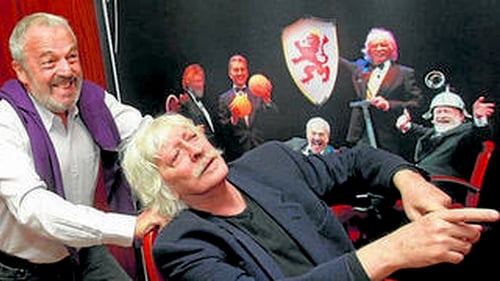
Himself - Violin
Les Luthiers is an Argentine comedy-musical group, very popular also in several other Spanish-speaking countries such as Paraguay, Guatemala, Peru, Chile, Ecuador, Spain, Colombia, Mexico, Uruguay, Bolivia, Cuba and Venezuela. They were formed in 1967 by Gerardo Masana, during the height of a period of very intense Choral Music activity in Argentina's state universities. Their outstanding characteristic is the home-made musical instruments (hence the name luthiers, French for "musical instrument maker"), some of them extremely sophisticated, which they skillfully employ in their recitals to produce music and texts full of high class and refined humor. From 1977 until his death in 2007, they worked together with Roberto Fontanarrosa, a renowned Argentine cartoonist and writer.

Carlos López Puccio
Formed in 1967 by Gerardo Masana, during the height of a period of very intense Choral Music activity in Argentina's state universities, Les Luthiers premiered this show on May the 30th, 1985 at the El Círculo Theater in Rosario, Argentina. PROGRAM: 1. Vea esta Noche; 2. Serenata Tímida; 3 . El Zar y un Puñado de Aristócratas Rusos...; 4. Una Canción Regia; 5. Truthful Lulu Pulls thru Zulus; 6. El Valor de la Unidad; 7. Les Nuits de París; 8. Pasión Bucólica; 9. Las Majas del Bergantín; 10. Bolero de los Celos; 11. Marcha de la Conquista and; 12. Cuarteto Opus 44. The 'Mandocleta' instrument was presented for the first time during this show. Recorded live at the Colón Theater in Bogotá, Colombia, on April 12, 1986. Numbers 11 and 12 were recorded earlier at that same theater on November 8, 1981. This is the last recorded appearance by Ernesto Acher with Les Luthiers.
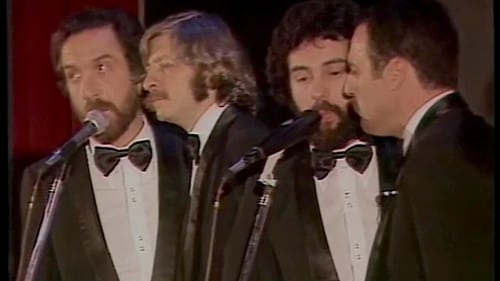
'Muchas Gracias de Nada', is a show premiered on June 15, 1979 at the Coliseo Theater in the City of Buenos Aires by the Argentinean ensemble of informal instruments, Les Luthiers. Recorded live between October 24th and 25th, 1980 at the same theater. PROGRAM: 1. La Campana Suonerá; 2. El Rey Enamorado; 3. Sinfonía Interrumpida; 4. La Tanda; 5. Canción para Moverse; 6. La Gallina Dijo Eureka; 7. Trío Op. 115; 8. Cartas de Color; 9. Tango Op. 11. In this show 'Antenor' made its first appearance, an advanced robot (for the time it was built - 1979) that weighed 80 kilos and was equipped with several motors that allowed it to move around the stage, turn its head, etc. The robot caught fire during the last performance of this play (Palacio de Bellas Artes, Mexico - 1980) in the middle of the stage and before the astonished gaze of all those who were there.
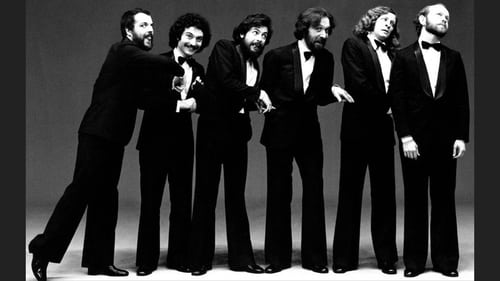
'Mastropiero que nunca' was a theatrical humour/music show by Les Luthiers, first performed on Friday 9 September 1977 and last done on Sunday 27 February 1983 (although it was headlining only during 1977 and 1978). It consisted of nine new (never performed previously) live numbers, which ranged from a madrigal to a salsa skit. PROGRAM: 1. Jingle Bass-Pipe (Obertura); 2. La Bella y Graciosa Moza Marchose a Lavar la Ropa; 3. El Asesino Misterioso; 4. Visita a la Universidad de Wildstone; 5. Kathy, la Rrina del Saloon; 6. El Beso de Ariadna; 7. Lazy Daisy; 8. Sonatas para Latín y Piano; 9. Payada de la vaca; 10. Cantata del Adelantado Don Rodrigo Díaz de Carreras, de sus Hazañas en Tierras de Indias, de los Singulares Acontecimientos en que se vió Envuelto, y de cómo se Desenvolvió; 11. El explicado. Two new instruments were introduced during this show: the 'Calephone da Casa' and the 'Shoephone'.

Director

Carlos López Puccio
Les Luthiers is a comedy-musical group from Argentina, very popular also in several other Spanish-speaking countries such as Paraguay, Peru, Chile, Ecuador, Spain, Colombia, Mexico, Uruguay and Venezuela. They were formed in 1967 by Gerardo Masana, during the height of a period of very intense Choral Music activity in Argentina's state universities.
















